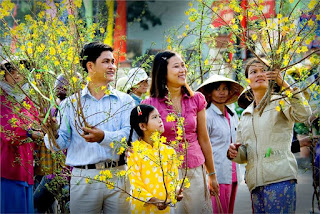Parenting Culture in Vietnam.
Vietnam
is a one of the special country that existed in South East Asian. Vietnamese
culture is very complex, in part due to the involvement of many groups in
Vietnamese history. As we know Western culture promotes individuality, the
family unit is very important in Vietnamese culture. This emphasis on collectively
includes an obligation to provide for the welfare of family members. Family
members are expected to work and behave for the good of their community.
Families may publicly criticize a member who is ill behaved; they may also know
as family achievements. Each member has a designated kinship term, and these
are used when addressing one another.
Even though the family is seen as a unit, the father or an older male has the highest responsibility and acts as an authority leader while delegating tasks and involving others in the decision making. From a very young age, the father and other family members educate the children on “filial piety,” a key part of Vietnamese culture which requires that children give parents and elders respect, love, and care.
In Vietnam, the family is consist of patriarchal ( relating to, or characteristic of a system of society or government controlled by men ) , patrilineal ( based on relationship to the father or descent through the male line ), and patrilocal ( relating to a pattern of marriage in which the couple settles in the husband's home or community ) . It is often we could see family members with two to four generations lives under one roof. There is the immediate family and the extended family. In Vietnam, the immediate family is the nuclear family plus the husband's parents and the grown sons' spouses and children. Grandparents help with childcare and children help with chores. Younger siblings are to respect and obey older siblings, and aunts and uncles, which also are treated as their parent as well.
Source: https://ethnomed.org/culture/vietnamese/vietnamese-cultural-profile
In Vietnamese society,
the father is the head and the leader of the family. However, unlike the father
in traditional Chinese society, who is empowered, at least theoretically, with
absolute rights over his children and wife, the Vietnamese father shares with
his wife and children collective and bilateral responsibility, legally,
morally, and spiritually.
- Parents & Child
In the relationship
between parents and children, as well as between husband and wife, the
Vietnamese people maintain most of their own custom and tradition, despite the
great influence of Chinese culture and Confucian doctrine. In the eyes of the
children, the Vietnamese mother has the same status as the father. She is also having
the power of love and the spirit of self-denial and sacrifice.
Vietnamese parents consider it a most important responsibility to brought up their children. By virtue of the principle of collective responsibility, the parents will bear and face the disgrace brought about by the activities of children who dishonor themselves just as they share the honor and fame of their virtuous and talented children.
At an early age, children are taught by their parents to behave according to the principle of filial piety. The family is the school in which the child learns the respect rules in both behavior and linguistic response. Filial piety consists of loving, respecting, and obeying one's parents. Talking back or acting rebelliously to the wishes of one's parents is evidence of lack of filial piety. For the Vietnamese, the obligation to obey his parents does not end with coming of age or marriage. Filial piety also means solicitude and support to one's parents, chiefly in their old age. Vietnamese elderly people will never live by themselves or in nursing homes but with one of their children, usually their eldest son.
This obligation is not discontinued by the parents' death. It survives in the form of ancestral cult and the maintenance of ancestral tombs. Ancestor worship is practiced in most, if not all, Vietnamese homes even in the homes of Vietnamese people living overseas. The child who lacks filial piety is rejected and expatriate by other members of the family and community. The worst insult which a Vietnamese can receive and by which he is deeply wounded is the expression "lack filial piety"
- Sibling relationships
In Vietnamese culture,
the relationship between siblings is determined by the principle of seniority,
which requires younger siblings to respect and obey older ones. The eldest
brother is entrusted with a heavy responsibility that of substituting for the
parents in case of emergency. He is considered by his siblings as their leader.
Concord and love among siblings is a sign of happy and virtuous family.
Source: http://www.vietspring.org/values/family.html
Source: http://www.vietspring.org/values/family.html




Good job in the explanation given. I thought Vietnamese fathers are just like Chinese fathers until I came across this blog. This has indeed cleared my uncertainties. In my opinion, parenting styles across cultures are similar in a way, and the only difference that sets them apart is the tradition and customs they oblige by. Again, good job!
ReplyDeleteIt is interesting to be able to just know little more about these ... :) *kudos.
ReplyDeleteVietnam is a an Asian country so yea :D
ReplyDeleteVietnamese people have a unique culture. It makes more sense to have a family geared culture than individualistic mode like the western culture.
ReplyDeleteWith all of the negative influences in society today, it's nice to watch and follow a family that is a positivie inspiration. learn more
ReplyDeleteThis comment has been removed by the author.
ReplyDeletethey are too bad with me (I live in a Vietnamese family)
ReplyDeletethey take all of my freedom they want me to be the first of class when I'm the seacond
they never let me use phone or anything
they want me to do every things they want but I'm a Russian